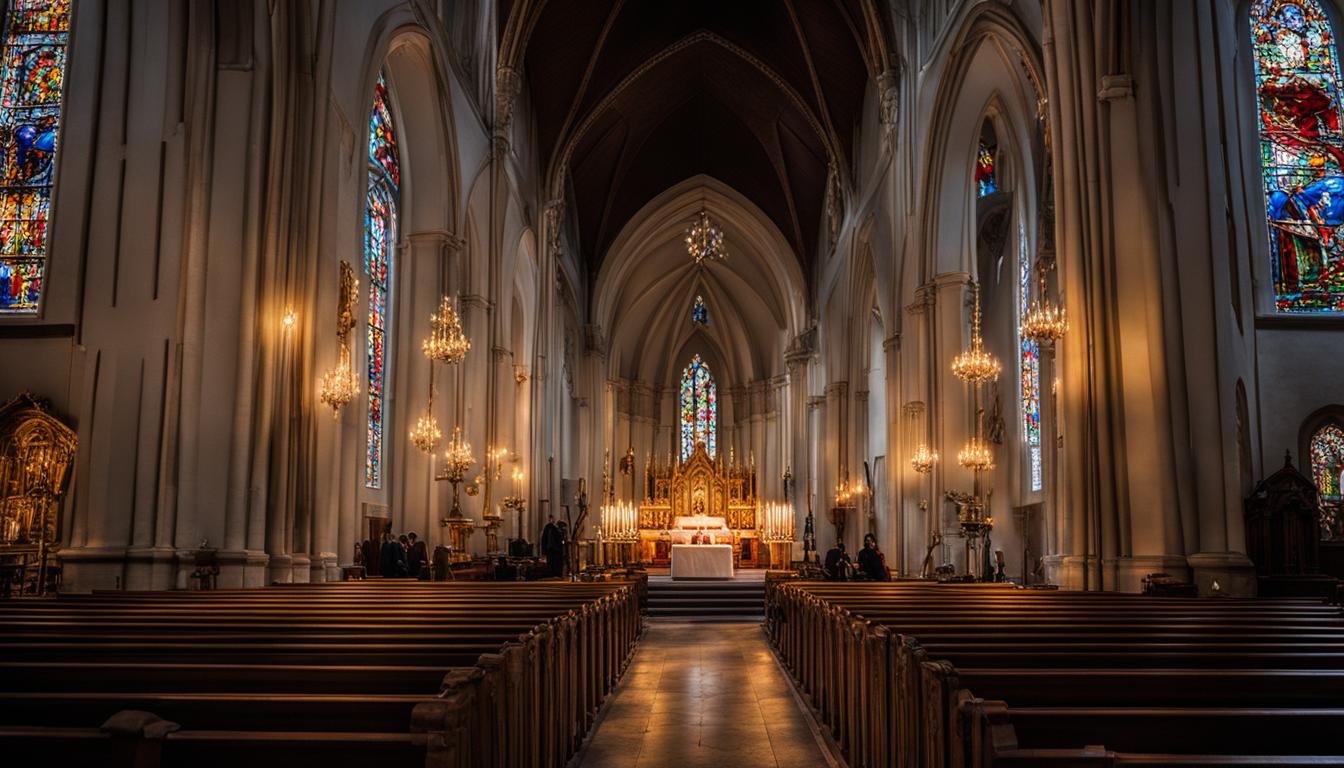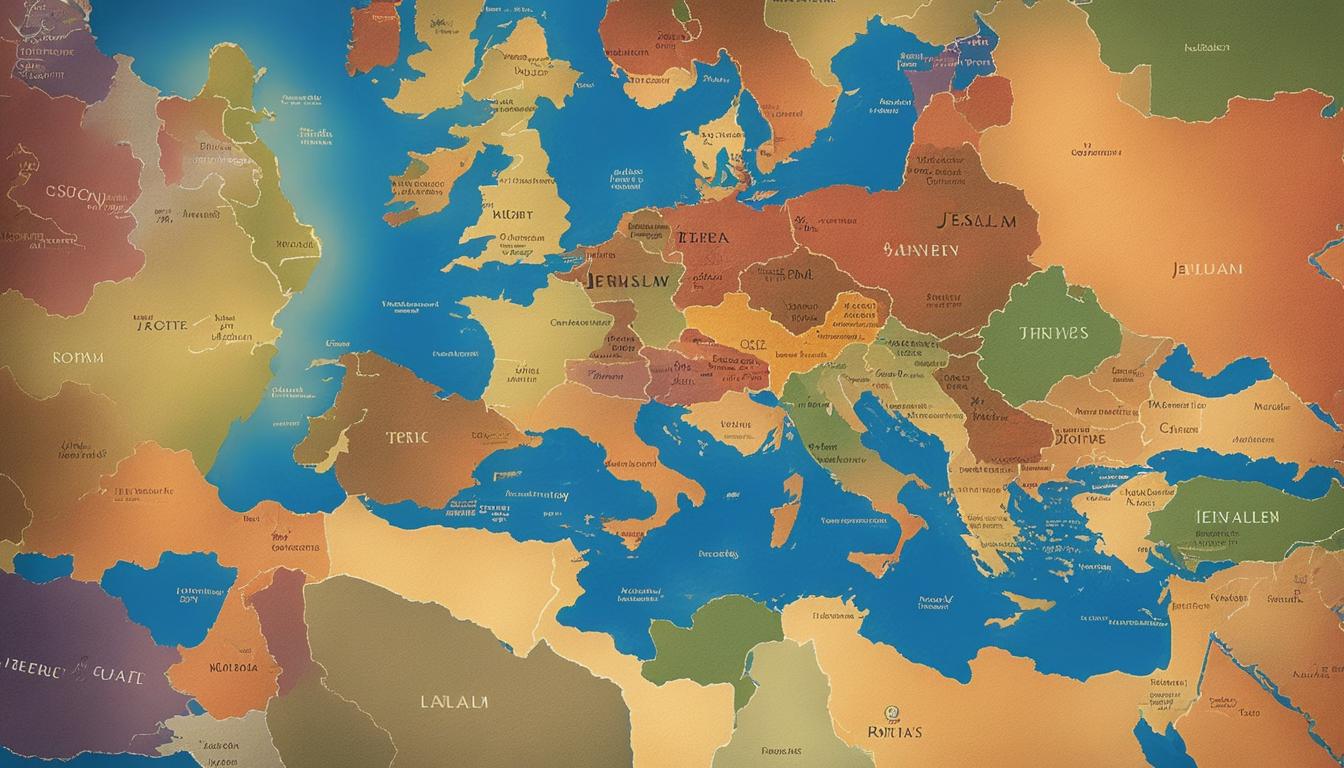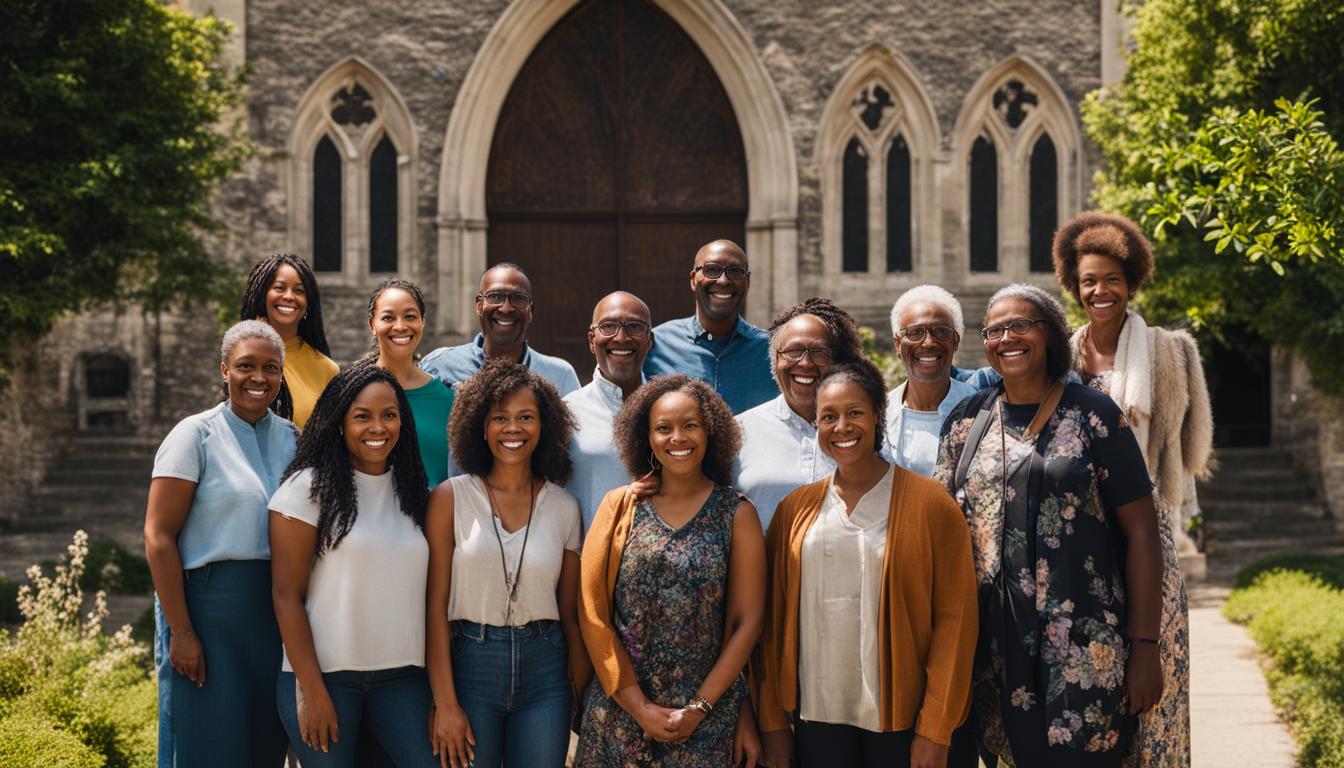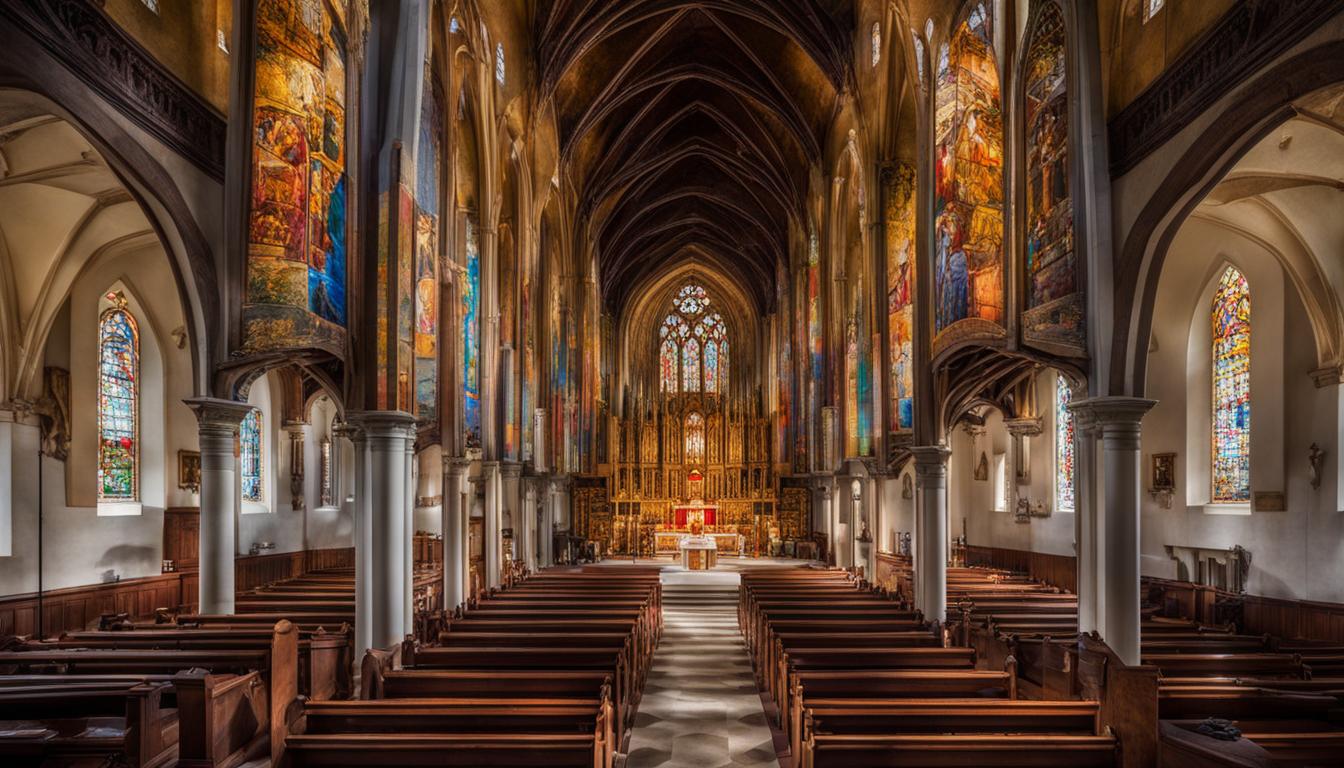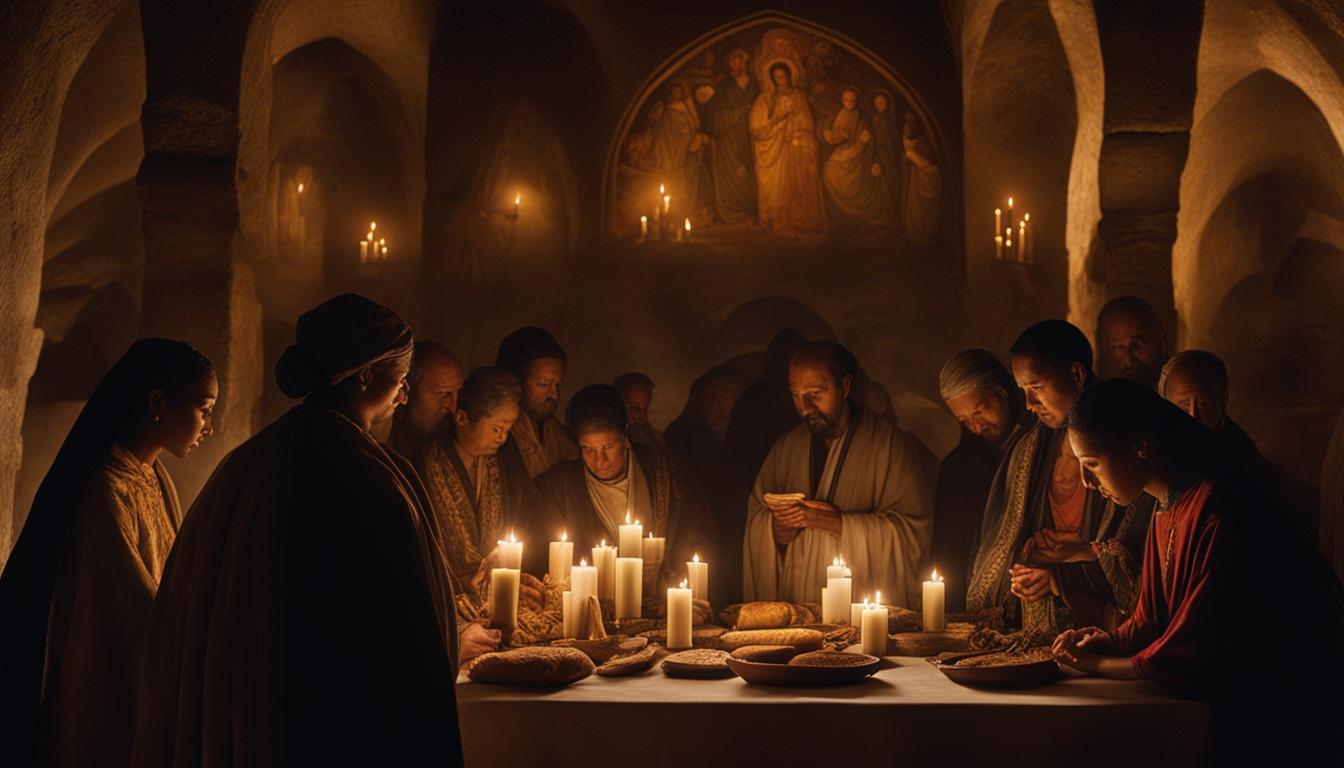Welcome to our article series on the global and local church! In this first section, we will delve into the significance of these two aspects of the church and how they play a crucial role in unifying faith. Whether you’re looking for a church near you or interested in understanding the dynamics of the local church community, this article will provide valuable insights.
Key Takeaways:
- The global church represents all believers worldwide, transcending geographical and cultural boundaries.
- The local church is a gathering of believers in a specific location, offering a spiritual community and opportunities for growth.
- Both the global and local church are essential for nurturing individual faith and fostering unity among believers.
- Finding a church near you can provide a sense of belonging and support in your spiritual journey.
- Engaging with the local church community allows you to connect with like-minded individuals and serve together for a greater impact.
The Universal Church: A Heavenly Assembly
The universal church, also known as the heavenly assembly, is a global and diverse community of believers who are united in their faith in Jesus Christ. It encompasses believers from all nations, tribes, and languages, forming an international church that transcends geographic boundaries. The universal church functions as a worldwide network of faith-based organizations that work together to spread the gospel and fulfill the mission of Christ.
The universal church is a testament to the unifying power of faith and the transformative work of the Holy Spirit. It is a community that extends beyond the constraints of time and space, connecting believers from different generations and cultures. Through their shared belief in Jesus Christ, members of the universal church are part of an eschatological assembly that anticipates the future gathering of all saints.
“For just as the body is one and has many members, and all the members of the body, though many, are one body, so it is with Christ.” – 1 Corinthians 12:12
The Worldwide Church Network
The universal church operates as a worldwide church network that facilitates collaboration and mutual support among different faith-based organizations. Through partnerships and shared resources, these organizations work together to promote the message of Christ’s love and salvation. They engage in various activities such as mission work, humanitarian aid, and discipleship programs to impact local communities and beyond.
A Faith-Based Organization
The universal church is not just a loose association of individuals; it is a structured and organized faith-based organization. This organization is guided by core beliefs and principles that shape its mission and activities. It provides a framework for worship, preaching, and teaching, as well as the administration of sacraments and ordinances. The universal church also fosters accountability and spiritual growth through its leadership and the mutual support of its members.
In summary, the universal church is a heavenly assembly of believers that transcends geographic boundaries and cultural differences. It is a global network of faith-based organizations united in their commitment to Christ. Through the universal church, believers find a sense of belonging, support, and a shared mission to spread the message of Christ’s love and salvation.
The Local Church: An Earthly Assembly
The local church serves as an essential component of the global church, providing a tangible and visible expression of the unity and fellowship among believers. It is within the local church that individuals come together in a specific location to worship, experience spiritual growth, and build meaningful connections with fellow members of the faith community.
Church services form the core of the local church, offering opportunities for congregants to engage in collective worship, receive biblical teaching, and participate in sacraments such as baptism and communion. These services provide a space for believers to commune with God and draw strength from the collective faith of the community.
In addition to church services, the local church often establishes a church directory to facilitate connection and engagement among its members. This directory serves as a valuable resource, enabling individuals to discover and get involved in various ministries and programs offered by the church. It promotes a sense of belonging and encourages active participation within the spiritual community.
A local church not only fosters spiritual growth but also provides a supportive and nurturing environment where believers can find encouragement, accountability, and care. It is within this spiritual community that individuals can forge deep relationships, find solace in times of hardship, and celebrate together during times of joy. The local church becomes a second family, offering a sense of belonging and a place to call home within the broader context of the global church.
| Benefits of the Local Church | Characteristics |
|---|---|
| Worship and Spiritual Growth: | Provides opportunities for collective worship and spiritual nourishment through preaching, teaching, and participation in sacraments. |
| Connection and Engagement: | Offers a church directory that connects members to ministries and programs, fostering active engagement within the faith community. |
| Supportive Community: | Provides a nurturing environment where believers can find support, encouragement, and accountability. |
Through the local church, believers experience the beauty of fellowship and discover the transformative power of community. It is here that the global and local church intersect, as the local church serves as a microcosm of the universal body of Christ. As individuals actively participate in their local faith communities, they contribute to the greater tapestry of the global church, playing a crucial role in unifying faith and advancing the mission of the gospel.
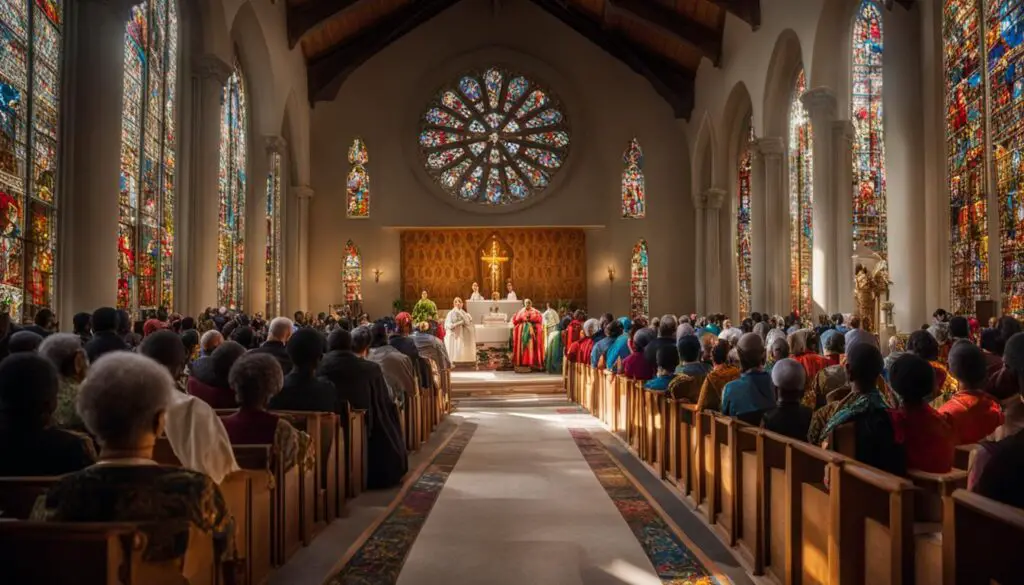
Two Uses of the Word “Church”
In the New Testament, the word “church” is used in two distinct ways. First, it refers to the universal church, which encompasses all believers who are part of Christ’s new covenant and kingdom. This heavenly assembly includes believers from all nations, tribes, and languages, united in their commitment to Christ. The universal church represents the larger, spiritual body of Christ that transcends physical boundaries and exists in the heavenly realms.
Second, the word “church” is also used to describe the local church. This refers to the regular gatherings of believers in a specific location, where they come together in the name of Jesus to worship and affirm their mutual belonging to him. The local church serves as a visible expression of the universal church, providing a tangible community for believers to connect, grow, and serve together.
Both the universal and local church are essential components of the Christian faith. The universal church reminds believers of their shared identity as kingdom citizens, while the local church nurtures their individual discipleship within a specific community. Together, they reflect the unity and diversity of the body of Christ.
“For where two or three gather in my name, there am I with them.” – Matthew 18:20
The Biblical Perspective: Unity of Global and Local Church
The biblical perspective emphasizes the importance of both the global and local church. Believers are called to pursue their individual discipleship within a local church, where they can grow in their faith and be part of a spiritual community. However, the local church is also called to partner with other churches, recognizing the unity and interdependence of the global church. This partnership strengthens the mission and impact of the church globally.
Discipleship is a core aspect of the Christian faith. It involves not only personal growth but also the responsibility to reach out and make disciples of all nations. Local churches provide the platform for believers to receive teaching, mentoring, and support as they walk their faith journey. Through discipleship, believers are equipped to live out their calling and fulfill the Great Commission.
Yet, the global church is more than just a collection of individual local churches. It is a body that transcends geographic boundaries and cultural differences. Partnership between local churches is vital to this unity. By collaborating and sharing resources, churches can amplify their impact and contribute to the advancement of the gospel on a global scale. This partnership often takes the form of joint initiatives, such as cross-cultural missions, humanitarian projects, and theological exchange programs.
In summary, the biblical perspective on the unity of the global and local church highlights the significance of discipleship within the local church while emphasizing the need for partnership with other churches. By embracing both aspects, believers can experience personal growth and contribute to the collective mission of the church, spreading the message of hope and love to all corners of the world.
Historical Impact: Scattering and Unity Efforts
The story of the Tower of Babel in Genesis is a vivid illustration of humanity’s pursuit of unity and the resulting consequences. According to the biblical account, after the flood, people gathered together in the plain of Shinar and decided to build a city and a tower that would reach the heavens. Their motive was to make a name for themselves and avoid being scattered across the earth. However, God intervened by confusing their languages and scattering them across the earth. This event not only created cultural and linguistic divisions but also hindered their unity.
Throughout history, humanity has made efforts to overcome the divisions caused by the scattering at Babel. The quest for unity has been a prevalent theme, especially in the context of globalization. Globalization aims to connect people, cultures, and economies across the world, fostering interdependence and cooperation. It seeks to break down barriers and create a more interconnected and unified global community.
“The more we globalize, the more we can unify. We have the opportunity to learn from one another, appreciate our differences, and work towards a common goal of peace and understanding.”
| Impacts of the Tower of Babel | Effects of Globalization |
|---|---|
| Creation of cultural and linguistic divisions | Increased cultural exchange and understanding |
| Conflicts and misunderstandings due to language barriers | Development of global communication networks |
| Scattering of people across the earth | Connectivity and mobility through transportation and technology |
| Fragmentation of societies and identities | Promotion of multiculturalism and diversity |
While the Tower of Babel symbolizes the consequences of human arrogance and the ensuing divisions, globalization offers the opportunity to embrace unity and understanding. By bridging cultural, linguistic, and geographical boundaries, globalization enables the exchange of ideas, traditions, and values, fostering a more interconnected and tolerant world.
Cultural Variation and Unity
Cultural diversity is a natural outcome of the scattering at Babel, resulting in a rich tapestry of diverse cultures and subcultures worldwide. Each culture possesses its own unique values, orientations, and communication styles, adding depth and vibrancy to the global community. As believers, we are called to celebrate this diversity while striving for unity, recognizing that the universal church encompasses believers from all cultures and backgrounds.
In the context of Catholicism, unity among all Catholics is an essential aspect of our faith. While we come from different cultural backgrounds and traditions, we share a common bond in our belief in Christ. As Pope Francis reminds us, “Unity is not uniformity, but rather a mosaic encompassing a variety of gifts, charisms, and ways of living the faith” (Evangelii Gaudium, 118). It is through embracing our cultural diversity and forging unity that we reflect the universal church and its inclusive nature.
“Unity is not uniformity, but rather a mosaic encompassing a variety of gifts, charisms, and ways of living the faith.” – Pope Francis
While cultural differences may exist, it is important to remember that our shared faith in Christ unites us in a profound way. The Universal Catechism of the Catholic Church reminds us that “the Church in Christ is like a sacrament—a sign and instrument, that is, of communion with God and of unity among all people” (CCC 775). Unity among Catholics is not just a goal to strive for, but a reflection of the very essence of the Church and its mission to bring all people together in Christ.
Benefits of Cultural Diversity in the Church
The cultural diversity within the Church brings numerous benefits and enriches the faith experience for all believers. It allows us to gain new perspectives, broaden our understanding of different traditions and customs, and deepen our appreciation for the beauty of God’s creation. Embracing cultural diversity also fosters greater compassion, empathy, and solidarity among believers, as we learn to walk alongside one another, respecting and valuing our differences.
| Benefits of Cultural Diversity in the Church | Examples |
|---|---|
| Richer Worship Experience | Exploring different styles of music, liturgy, and prayer |
| Increased Global Perspective | Learning about the struggles and triumphs of believers in different parts of the world |
| Expanded Evangelization Opportunities | Reaching out to diverse communities and sharing the Gospel in culturally relevant ways |
By embracing and celebrating our cultural diversity, we can create a Church that is truly reflective of the universal body of Christ, united in faith and love. As we journey together, may we continue to strive for unity while cherishing the unique tapestry of cultures that enrich our common faith.
Global Leadership and Synodality
Pope Francis has initiated a three-year synodal journey, implementing a decentralized synodal approach to leadership within the Catholic Church. This innovative approach aims to promote collaboration, inclusivity, and shared decision-making at all levels of the global church. The synodal journey involves consultations and discernment at the diocesan, continental, and universal levels, allowing for diverse voices to be heard and considered in the decision-making process.
This synodal approach reflects the recognition that the church is not just a hierarchical institution but a community of believers who are all called to participate in the mission of spreading the gospel. By involving laity, pastors, and the Bishop of Rome in the synodal process, the global church embraces the principle of “synodality,” which emphasizes the co-responsibility of all members of the church in fulfilling its mission.
This decentralized synodal approach also acknowledges the unique challenges and realities faced by different regions and communities within the Catholic Church. It allows for a more context-specific approach to decision-making, taking into account the cultural, social, and political nuances of different regions. Through this process, the global church seeks to foster unity while respecting and valuing the diversity within its membership.

Promoting Unity and Collaboration
The synodal journey is not only a means to achieve shared decision-making but also a significant step towards promoting unity and collaboration within the global church. By actively engaging in consultation and discernment, the church acknowledges that unity is not the result of a top-down approach, but rather a collective effort that requires active participation from all members.
Through this synodal approach, the global church seeks to create a culture of dialogue, listening, and mutual respect. It encourages open and honest conversations about the challenges and opportunities faced by the church, facilitating the sharing of diverse perspectives and experiences. This collaborative process helps to build consensus and develop a greater sense of ownership and commitment among the members of the church.
The synodal journey serves as a powerful testament to the church’s commitment to inclusivity and reflects its deep-rooted belief in the priesthood of all believers. By embracing synodality, the global church recognizes that every member has a unique role to play in the fulfillment of its mission, and that unity can only be achieved when the voices and gifts of all are valued and integrated into the decision-making process.
Conclusion
Exploring the global and local church reveals the unity and diversity of the Body of Christ. The universal church encompasses all believers, transcending languages, cultures, and geographic boundaries. It is a testament to the power of Christ’s sacrifice, as we are created anew by the Body and Blood of Christ.
The local church provides a tangible expression of this unity, offering a spiritual community where believers find healing and hope. Through the regular gatherings of the local church, we come together to worship, fellowship, and serve one another. It is within the local church that we experience the transformative power of Christ’s presence.
The call for unity among all Catholics reflects our ongoing effort to overcome cultural divisions and embrace our shared faith in Christ. The universal church is the source of our healing and hope, as it encompasses believers from all walks of life, united by their love for God and one another. Together, we strive towards unity and reconciliation, guided by the unifying power of the Body and Blood of Christ.
FAQ
What is the difference between the universal church and the local church?
The universal church refers to all believers who are part of Christ’s new covenant and kingdom, regardless of location. The local church, on the other hand, is a specific gathering of believers in a particular location.
What does the local church provide for believers?
The local church offers a spiritual community where believers can worship, fellowship, and serve together. It also provides church services such as preaching and teaching, as well as support, encouragement, and accountability for individual growth.
How does the global church overcome cultural differences?
While cultural variation exists within the global church, believers are called to celebrate diversity while striving for unity. This unity reflects the universal church’s encompassing believers from all cultures and backgrounds.
What is synodality in the global church?
Synodality is a leadership approach that emphasizes collaboration and shared decision-making within the global church. It involves consultations and discernment at various levels, promoting unity and inclusivity through a decentralized approach.
How does the global church embrace unity and reconciliation?
The unifying power of the Body and Blood of Christ is central to the global church’s pursuit of unity and reconciliation. Through faith in Christ, believers find healing and hope, contributing to a world seeking unity.

